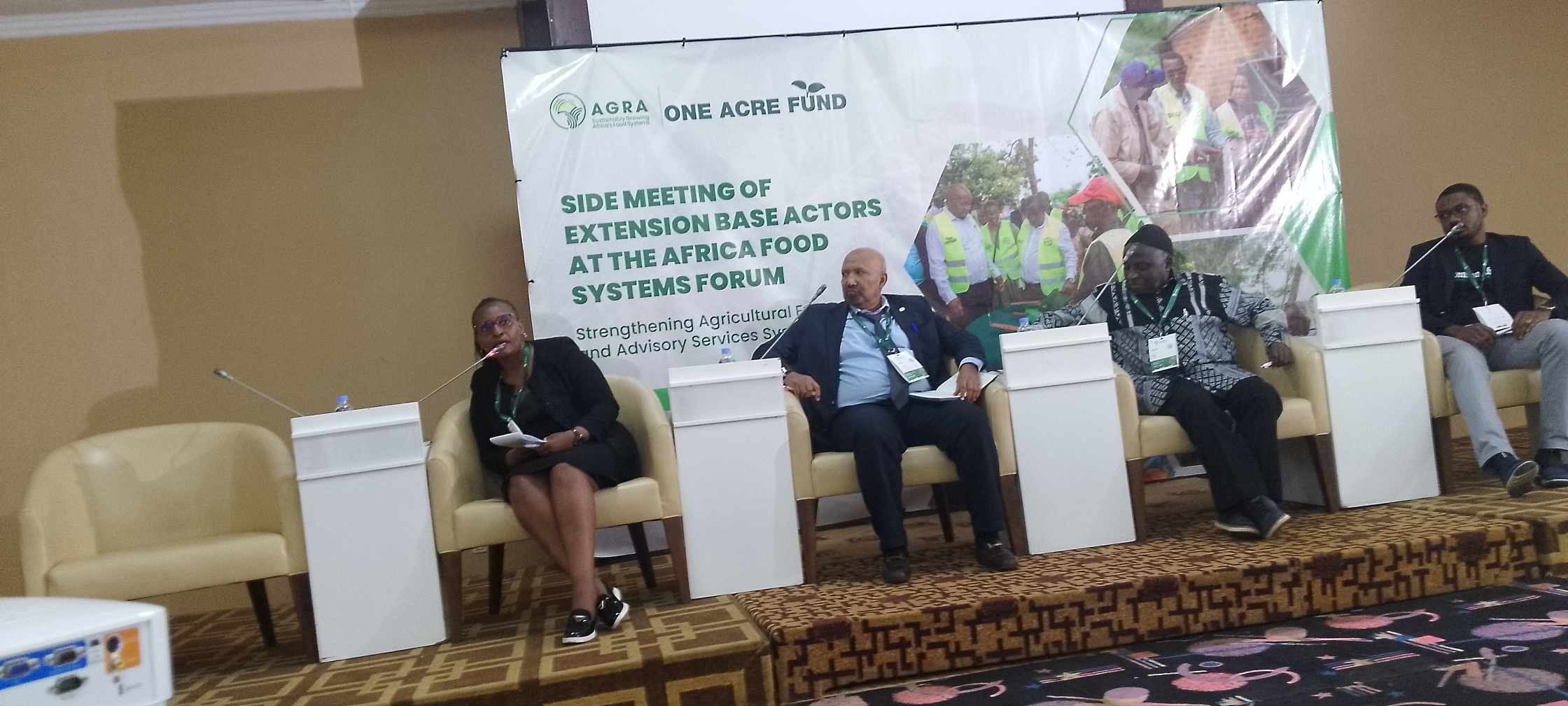The provision of extension services tied to research and development will improve the capacity of smallholder farmers to increase agricultural production and productivity.
This came to the fore yesterday during a side meeting of extension base actors held at the Lemigo Hotel in Kigali, Rwanda at the African Food Systems Forum running from the 2nd to the 6th of September 2024.
In his keynote address, Prof Hamady Boga, the Alliance for a Green Revolution in Africa (AGRA) Vice President in charge of Programs, underscored the importance of extension services in improving the productive capacity of African smallholder farmers in pursuit of attaining food and nutrition security.
“African smallholder farmers still have very low yields. The average metric tons per hectare is hovering around two metric tons or below. So that is still unacceptable. Just by realizing the potential of current technologies, we can go to six metric tons per hectare. Some countries have tried and they have moved the needle a little bit, like Ethiopia. So that is a challenge that we have to address. Because of the vulnerability of climate, we see again that these yields, although they are low, are also declining. And in some cases, we have had total crop failure in some years and the drought has become more frequent, more severe, and impacting more on the livelihoods and production of the smallholder farmer.
“So this is a challenge. And still, the African smallholder farmer is struggling to access markets, even for the produce that can be put on the market. It is a big struggle. The markets are still unstructured. So we go into AGRA 3.0, knowing that we have to address these issues, and we come here to discuss with you as partners so that we can find ways in which to improve the condition of the smallholder farmers in Africa. And one of the areas I feel is under-discussed, and which I feel is the main tool that can address all these issues put together here is the area of extension, tied to research and development,” Prof Boga said.
Anastasia Mbatia, the Deputy Director of the Farm to Market Alliance (FtMA), said the barriers to extension include an ageing farming population (average of 50-60 years old) and also ageing extension force; wide extension farmer ratio, and the lateness of service delivery.
Tajudeen Yahaya, the Chief Executive Officer of Extension Africa, said his youth-led organization is using technology to address extension gaps.
“We are engaging the youth into the farming system with a business-focused approach by providing extension as a business. We have trained the youth in technical skills, business skills, digital skills, and soft skills. We are addressing fragmentation in knowledge delivery, and digitizing extension content in a context-specific manner,” Yahaya said.
Dr. Chrys Akem, the Deputy Director of the International Institute of Tropical Agriculture (IITA), said there is a need to move beyond just research to program delivery.
“We need to link smallholder farmers to businesses and the private sector as well as engage the government and source funding through development banks like the African Development Bank (AfDB), and the World Bank,” he said.
Dr. Silim Nahdy, the Executive Director of the African Forum for Agricultural Advisory Services (AFAAS), said his institution has a mandate from the African Union on Extension and Soil Health.
“I believe there is a need for a framework to unite actors by focusing more on the base level (farmer level). The public extension needs to move more into a business approach. Digitalization could help reach 30-40% of farmers who have digital access. The virtual marketplace could help create market access as well. No single model could solve all the problems, but we need to identify the right model to apply in different contexts. We need a forum where we can jointly influence the government, being the ones who know where it hurts most. If we make it work, the government will put in funding as they would love to identify with success,” Dr. Nahdy said.
Sara Mbago-Bhunu, Director of East and Southern Africa, International Fund for Agricultural Development (IFAD), said there are many opportunities to improve last-mile delivery, with IFAD helping to finance ecosystems.
“There is a need to work with the government to improve the land tenure system (land access, release of lands to young people for agriculture). The e-voucher system also presents an opportunity and allows agro-dealers to access credit through digital channels. We can also use digital tools to enhance plant and animal health. We need to move from supply-driven to demand-driven extension,” she said.
Dr. Nomathemba Mhlanga, the Agribusiness Officer for East Africa at the Food and Agriculture Organization (FAO) underscored the need to work with member countries to promote pluralistic extension services to ensure extension is demand-driven and climate-sensitive.
Ben Grove, the Director of Virginia Tech, emphasised the promotion of the cooperative extension model, involving Federal, State, and County actors, all investing together; connecting research and development in a two-way format, ensuring that all practitioners are connected.
Dr. Mel Oluoch, Director of Strategic Partnerships, African Fertilizer and Agribusiness Partnership (AFAP) said his institution launched the Sasakawa fund to support training across the value chain (from universities to the grassroots) and engaged farmers to be business-focused.
Dr. Rebbie Harawa, Director of African Progam, International Crops Research Institute for the Semi-Arid Tropics (ICRISAT), said his institution focused on technologies to transform dryland areas which represent about 40% of lands in Africa.
“This land supports some of the adapted crops in Africa like Millet and Sorghum. We are working to develop these varieties. There is a need to consider whether the indicators we are measuring are important to farmers. We are also working to ensure access to seeds, technology, and digital platforms,” Harawa said.






